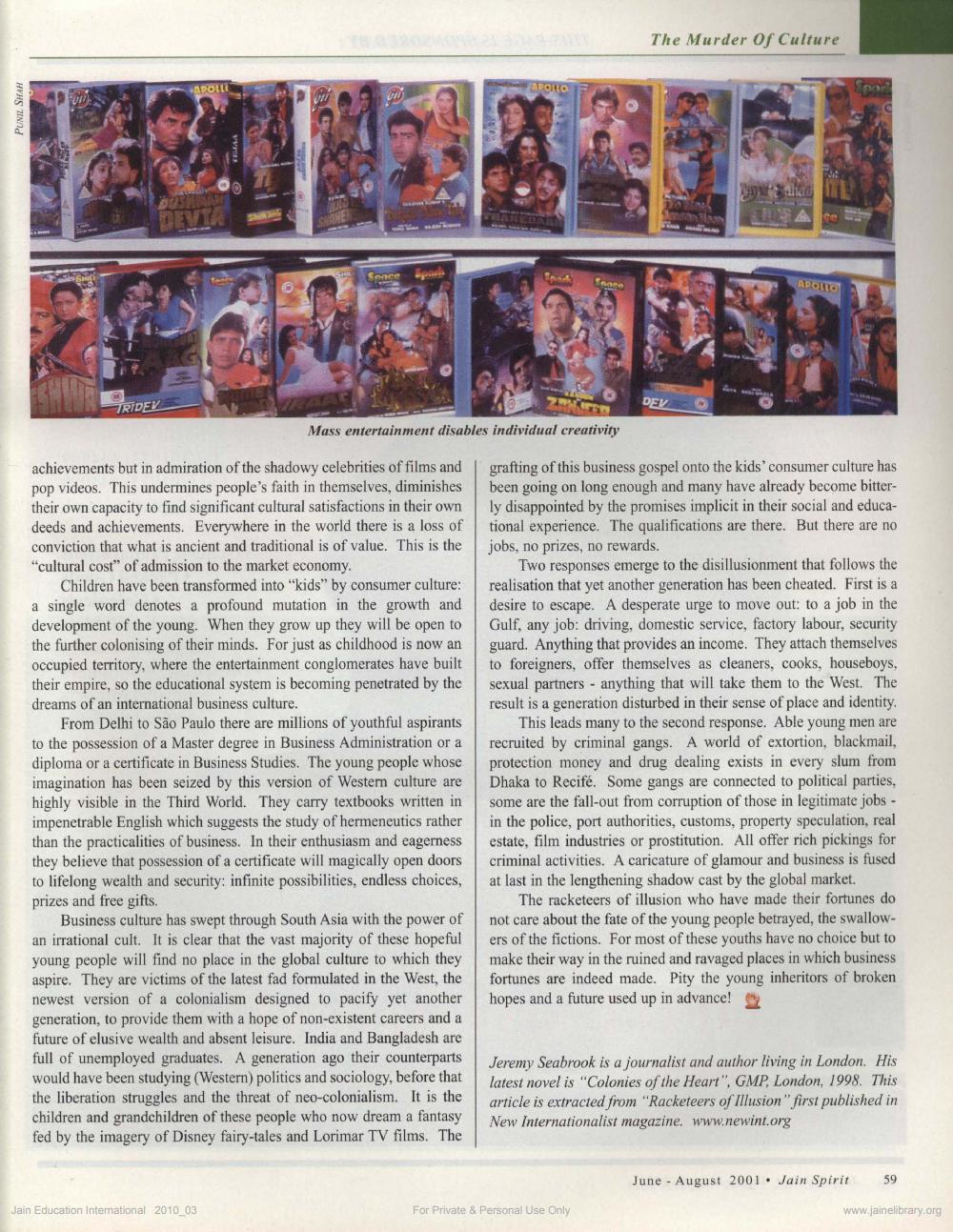________________
The Murder of Culture
Аро
APOLO
PUNIL SHAH
APOIO
TRIDEV
Mass entertainment disables individual creativity
achievements but in admiration of the shadowy celebrities of films and pop videos. This undermines people's faith in themselves, diminishes their own capacity to find significant cultural satisfactions in their own deeds and achievements. Everywhere in the world there is a loss of conviction that what is ancient and traditional is of value. This is the "cultural cost of admission to the market economy.
Children have been transformed into "kids” by consumer culture: a single word denotes a profound mutation in the growth and development of the young. When they grow up they will be open to the further colonising of their minds. For just as childhood is now an occupied territory, where the entertainment conglomerates have built their empire, so the educational system is becoming penetrated by the dreams of an international business culture.
From Delhi to São Paulo there are millions of youthful aspirants to the possession of a Master degree in Business Administration or a diploma or a certificate in Business Studies. The young people whose imagination has been seized by this version of Western culture are highly visible in the Third World. They carry textbooks written in impenetrable English which suggests the study of hermeneutics rather than the practicalities of business. In their enthusiasm and eagerness they believe that possession of a certificate will magically open doors to lifelong wealth and security: infinite possibilities, endless choices, prizes and free gifts.
Business culture has swept through South Asia with the power of an irrational cult. It is clear that the vast majority of these hopeful young people will find no place in the global culture to which they aspire. They are victims of the latest fad formulated in the West, the newest version of a colonialism designed to pacify yet another generation, to provide them with a hope of non-existent careers and a future of elusive wealth and absent leisure. India and Bangladesh are full of unemployed graduates. A generation ago their counterparts would have been studying (Western) politics and sociology, before that the liberation struggles and the threat of neo-colonialism. It is the children and grandchildren of these people who now dream a fantasy fed by the imagery of Disney fairy-tales and Lorimar TV films. The
grafting of this business gospel onto the kids' consumer culture has been going on long enough and many have already become bitterly disappointed by the promises implicit in their social and educational experience. The qualifications are there. But there are no jobs, no prizes, no rewards.
Two responses emerge to the disillusionment that follows the realisation that yet another generation has been cheated. First is a desire to escape. A desperate urge to move out: to a job in the Gulf, any job: driving, domestic service, factory labour, security guard. Anything that provides an income. They attach themselves to foreigners, offer themselves as cleaners, cooks, houseboys, sexual partners - anything that will take them to the West. The result is a generation disturbed in their sense of place and identity,
This leads many to the second response. Able young men are recruited by criminal gangs. A world of extortion, blackmail, protection money and drug dealing exists in every slum from Dhaka to Recife. Some gangs are connected to political parties. some are the fall-out from corruption of those in legitimate jobs - in the police, port authorities, customs, property speculation, real estate, film industries or prostitution. All offer rich pickings for criminal activities. A caricature of glamour and business is fused at last in the lengthening shadow cast by the global market.
The racketeers of illusion who have made their fortunes do not care about the fate of the young people betrayed, the swallowers of the fictions. For most of these youths have no choice but to make their way in the ruined and ravaged places in which business fortunes are indeed made. Pity the young inheritors of broken hopes and a future used up in advance!
Jeremy Seabrook is a journalist and author living in London. His latest novel is "Colonies of the Heart". GMP, London, 1998. This article is extracted from "Racketeers of Illusion" first published in New Internationalist magazine. www.newint.org
June - August 2001. Jain Spirit
59
Jain Education International 2010_03
For Private & Personal Use Only
www jainelibrary.org




